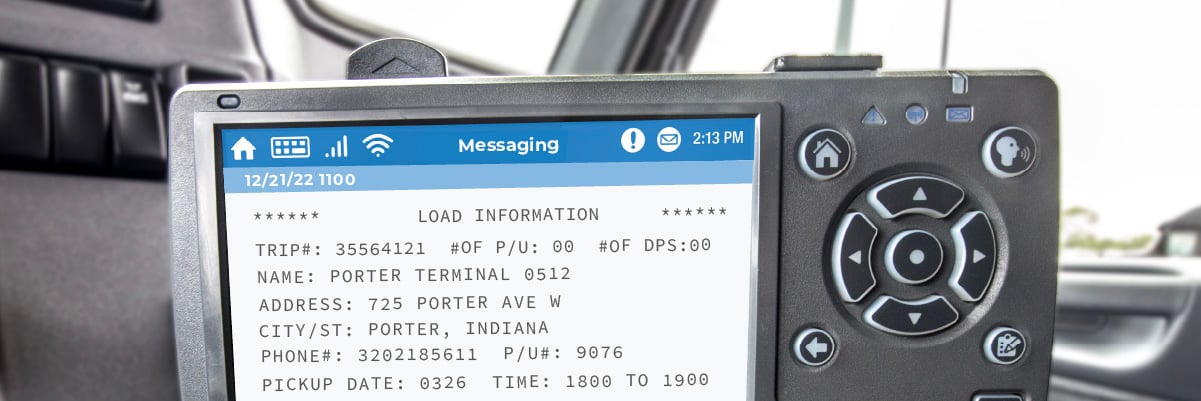The Real Truth About Forced Dispatch: 9 Frequently Asked Questions
Samantha has been working at ATS since 2013, where she began in operations support in the specialized division. She quickly transitioned into a specialized driver manager role and began managing her own fleet of drivers. Samantha currently acts as an operations manager in the van division.
Forced dispatch is a hot topic, and for good reason. It’s controversial. Some drivers even quit over it.
You probably have a lot of concerns about it, and I understand why.
Forced dispatch gets a bad reputation.
Even the name itself sounds...well, forced.
Many drivers think that forced dispatch means you will be forced to haul a load no matter what. There’s a lot more to it than that.
You, like many other drivers, might be hesitant to pursue a career path as a company driver with a trucking company if you see that they do forced dispatch.
Refusing to work for a trucking carrier or to become a company driver because a company does forced dispatch could be holding you back from an incredible opportunity at a fair, high-paying, respectable carrier.
As an operations manager at Anderson Trucking Service (ATS), I have worked with drivers and dispatchers for years. So I understand some of the concerns you may be having, and I’ve talked about these concerns with drivers just like you.
By the end of this guide to forced dispatch, it won’t seem so scary to you. You’ll learn everything that truckers need to know about forced dispatch including what it is, when it’s okay to reject a load and how you can work with your dispatcher to ensure you’re getting loads that help you reach your pay and home-time goals.
What is Forced Dispatch?
Real talk: What really is forced dispatch?
Let’s start with the name.
Forced dispatch is a bit of a negative name. It suggests that drivers absolutely must haul each and every load that their dispatcher gives them.
In reality, assigned freight or assigned loads may be better terms. It is a partnership between you — the driver — and your dispatcher.
Forced dispatch happens when, instead of giving you a handful of freight options, your dispatcher presents you with one option. When you’re close to getting empty, your dispatcher will advise you on a load. They’ll work it out with you to ensure you can haul the load.
This is where the bad reputation comes in. Some drivers think they will be forced to haul a load no matter the situation — no matter if they’re sick, about to go home or if they feel unsafe hauling the freight in the current weather conditions.
That isn’t how it works.
Your dispatcher should know your schedule inside and out. They’ll know when you have home time and shop time. They’ll know when you have a vacation on the schedule. They’ll know what areas you’re scheduled to be in and what your customer drop-off times are.
They should know where you don’t prefer to drive and the loads you don’t like to haul, too. While they can’t guarantee that you won’t be put on those loads in areas you don’t love from time to time, their job is ultimately to make you successful and they will give you the loads to make you successful.
For instance, if you prefer not to drive in the northeast (as many drivers don’t) your dispatcher will often get you out of the area immediately. One load in, one load out.
Each load you are presented with takes all of these factors into account. Your dispatcher will not purposely only present you with crappy loads that take you into areas you hate; they have your best interest at heart.
They’ll advise you of the load they have for you, and if there are concerns, you would express them at that time. You’ll talk through your concerns with your dispatcher.
If a carrier forces you to take a load — despite issues with hours of service, safety, illness or another concern — they are not a good carrier. And, they can get in a lot of trouble for forcing you to take the load with the threat of withholding wages or punishing you in another way.
In fact, forcing a driver to haul a load against their will is illegal. If a trucking carrier coerces you to haul a load — with the threat of punishment held over your head — when you are not fit to do so, they can be fined and even lose their authority to operate under guidelines set by the Federal Motor Carrier Safety Association (FMCSA).
A driver that is coerced to take a load when they feel unfit to do so can report their carrier to the FMCSA.
It goes without saying that if your carrier is forcing you to haul loads when it’s unsafe for you to do so, that is not the right carrier for you and it’s time to start looking elsewhere.
Why do Companies Do Forced Dispatch?
You may be asking yourself, “Why do trucking carriers do forced dispatch if it’s so controversial?”
It’s a great question.
Trucking carriers have a responsibility to both their drivers and their customers. They have committed to hauling freight for customers in a timely fashion. They have a duty to their customers, which is why they implement forced dispatch, or assigned loads, on company drivers.

Forced dispatch isn’t assigned to simply irritate drivers; it’s to make sure customers’ needs are met. The more a carrier meets the needs of a customer, the more likely a carrier will be able to do more business with them — which means more load opportunities for you and the promise of a steady paycheck.
Additionally, because the company driver isn’t responsible for their truck payments, fuel costs or maintenance costs, the carrier needs to ensure that the truck is still running and it’s making revenue. When the truck makes revenue, so does the driver.
When is it Acceptable to Reject a Load? Frequently Asked Questions
Drivers typically have a list of questions when it comes to forced dispatch, including when and if they can reject a load.
I’ll answer all your most frequent questions about forced dispatch and rejected loads below.
Can I Reject a Load?
When it comes to answering the question, “Can I reject a load on forced dispatch?” the answer is, it depends.
Flat-out rejecting a load from your dispatcher for no other reason than you don’t feel like hauling a load to that area, you don’t want to tarp a load or you’d rather not haul to that customer this week is not a good reason to refuse a load.
There is a fine line between rejecting a load because you don’t feel like it and rejecting a load because you are unfit to haul it.
For instance, there are aspects of my job that I don’t like.
- Angry customers? No thanks.
- Unhappy drivers? I wish I could make every driver happy all the time.
- Filling out reports? Ugh.
I don’t love dealing with these things on the job, but I know I have to because it’s what I signed up for.
On the other hand, if…
- I have a migraine or I’m throwing up with the flu
- My child is home sick
- I have a doctor’s appointment I’ve been waiting months for
- I’m the matron of honor at my sister’s wedding
...and my boss tries to get me to come into work, I’m going to say no and I’m going to try to work something else out with them. And if this happens repeatedly with my boss, I’m going to start looking for a job elsewhere.
If you have legitimate reasons for needing to reject a load — illness, home time, an unexpected circumstance, you’re coming up against your hours of service — your dispatcher will work with you to either get you home or get you a different load that works into your schedule better.
Remember: Forcing a driver to take a load against their will is illegal. You don’t have to put up with unfair practices, and you shouldn’t.
Will I Get Home on Time?
Your dispatcher will know your schedule, which means they’ll know when you have home time on your schedule. They won’t give you a load that will conflict with home time.
For instance, if you’re planning on going home in a couple of days, they will give you a load that keeps you closer to home. They won’t give you a load that sends you across the country.
If they consistently give you loads that prevent you from going home, you’re either not giving them enough time in advance to throw home time into your schedule, or you’re probably working at a carrier that doesn’t value its drivers as it should.
Does it Pay Enough?
We’ve all heard that nasty rumor out there that company drivers on forced dispatch are given the worst loads, and independent contractors with the company (like lease operators) get the best loads.
That’s simply not true.
It is a myth that company drivers are forced to take the crappy loads and independent contractors get the perfect loads. While they do have a choice on which loads they’ll haul, they aren’t getting the “best of the litter.” Independent contractors are only offered a few load options.
Loads are evenly dispersed, with no favor given to one driver over the other.

Your dispatcher wants you to be successful and keep you happy; if you aren’t successful and happy, they won’t be either. It is in their best interest to foster your growth and nurture your success so that you grow with the company — not leave it because you are unhappy.
Giving you only “bottom of the barrel” loads is not a recipe for success or happiness.
Instead, your dispatcher will take all variables into account — upcoming home time or vacations, shop time, recent illness and more — before presenting you with a load.
Sure, you will not always get perfect loads, but if you feel like you are only getting low-paying loads trip after trip, it may be cause for concern. Talk about your concerns with your dispatcher.
What about my Hours of Service?
Remember, it’s illegal to coerce a driver to work outside their hours of service. Your dispatcher should be aware of your hours and they will not give you a load that conflicts with this.
If they do suggest a load that comes up against your hours of service, let them know. They should work with you to either let you pick up the load later when you’re on active hours again or they’ll find a different load for you that doesn’t conflict.
Your dispatcher can talk to the customer to see if delivery times can be adjusted.
So it’s important for you to communicate when you can’t take a load because of your hours of service. Your dispatcher will work with you on a solution, which may mean finding something that fits your hours of service better.
What if I have Shop Time?
Just like with your hours of service, your dispatcher should know when you have shop time scheduled. If they absolutely need you on a load, they will see if they can switch your shop time.
They’ll try to determine if the repair is needed immediately or if your truck maintenance can be completed when you drop your next load off.
If not, they may work with the customer to adjust delivery times. This will allow you to haul the load once your truck is out of the shop.
What if I’m Sick or Have a Family Emergency?
If you’re ever too sick to haul a load, talk to your dispatcher. You shouldn’t be on the road driving when you aren’t feeling your best. It not only puts you at risk, but it also puts other motorists at risk.
You should always report when you are sick so that dispatchers know not to search for freight for you.
Similarly, if a family emergency pops up, communicate with your dispatcher. You may be too unstable to drive. Just like when the weather is too poor to drive, they should encourage you to shut down until it is safe for you to run again.
If you need to get home to be with your family, they’ll work with you to get you home as soon as possible.
Is a Company Driver Position with Forced Dispatch Right for Me?
Just like with any job, you may get some tasks that you don’t like. You may not love having to tarp a load, but if the job calls for it, the job calls for it. It’s a part of the job you applied for and accepted.
However, as a company driver, you’ll receive a number of benefits that may outweigh your dislike of forced dispatch. Your truck payment, fuel and maintenance costs will be paid for. You’ll receive company-sponsored benefits. You’ll also receive stable pay as a company driver.
You may find that these benefits outweigh your lack of choice on every load you haul.
However, if you would like the freedom to choose your loads, you may instead want to pursue an independent contractor position. You will be given a few freight options to choose from and you can make the best decision for yourself and your business regarding what you’ll haul.
Keep in mind, you will not receive the same benefits that a company driver will. You’ll need to make truck payments and cover fuel and maintenance costs.
When you’re talking to a recruiter and weighing your options regarding being a company driver or independent contractor, you should have a checklist. If forced dispatch is a concern for you, ask questions like:
- Do you do forced dispatch?
- What are the company driver benefits?
- What is your home time policy?
- How often do drivers reject a load?
- How many load options will I get as an independent contractor?
- Where is your customer base?
For instance, if going into the northeast is an absolute no-go for you — no matter how much money you make hauling loads there — this is something you should articulate with your driver recruiter. You should not choose to work for a trucking carrier that has a large customer base in the northeast.
Your expectations with the carrier should always align. If you feel like they won’t respect you and your needs, you shouldn’t work with that carrier.
Get a feel for whether or not a carrier respects its drivers by reading reviews and talking to other drivers.

Keep on Trucking!
Forced dispatch works well for many drivers. The key is having a great relationship with your dispatcher. Keep communication at the forefront of your relationship.
If you are constantly struggling with your dispatcher, talk to an operations manager. They can mediate as you work through your issues with your dispatcher. They’ll work through the communication barrier to come to a resolution.
Remember: if a trucking carrier is forcing you to haul a load when you are ill, have a family emergency, have a planned vacation, or are outside of your hours of service, that is not okay. You should not be working with a carrier that encourages you to be unsafe. Your safety should be a value for both you and your dispatcher.
At ATS, we give our drivers the respect they deserve. Our dispatchers are well-trained and have our drivers’ best interests at heart.
We have a number of perks, including great pay, benefits, home time and paid time off and a pet policy that lets you take your pets on the road with you. Learn more about all of our company driver benefits.

